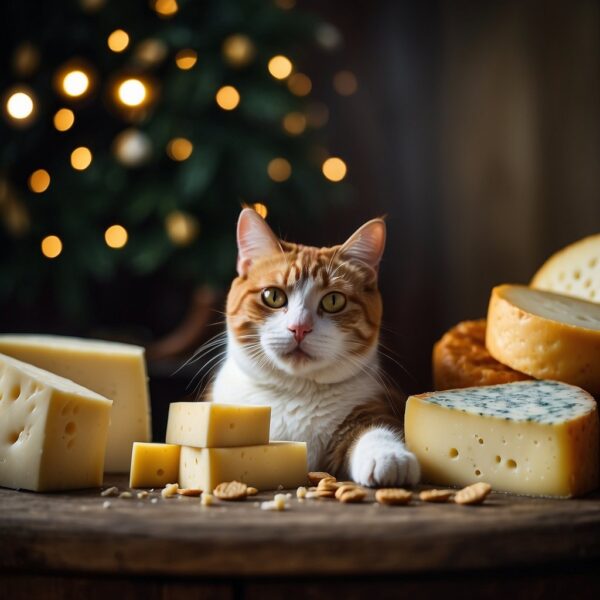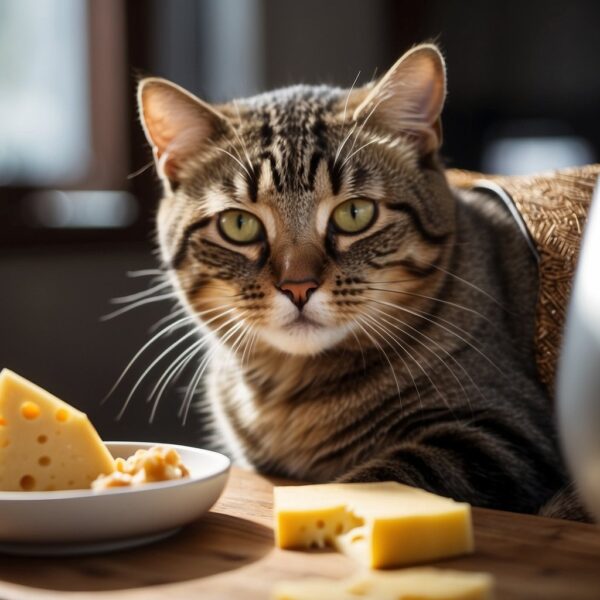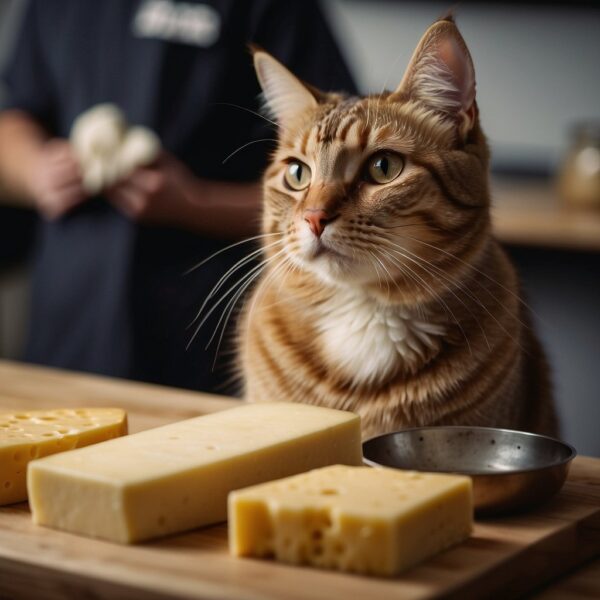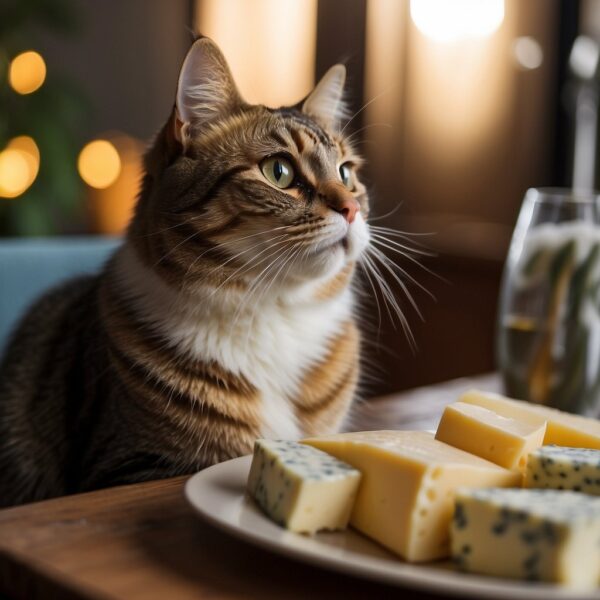
Can Cats Eat Cheese? Understanding Feline-Dairy Relations
Can cats eat cheese is a common question cat parents ask. While the image of a cat happily lapping up a saucer of milk is ingrained in popular culture, the reality is that many felines are lactose intolerant. As a result, while cheese can be a source of protein and fat for cats, its lactose content means it should be offered with caution. The key is to give cheese in moderation and to be aware that, as cats age, they may become less tolerant to lactose.
When considering cheese as a treat for cats, it’s crucial to recognize that the benefit must be weighed against the potential for digestive upset. Cheese is not a necessary part of a cat’s diet, which should be nutritionally complete as recommended by a veterinarian. Moreover, certain types of cheese may be more suitable than others for an occasional treat. The bottom line is that cheese should not be a regular part of a cat’s diet but, in small amounts, may be offered as an infrequent indulgence.
Key Takeaways
- Cats can consume cheese in small quantities.
- Cheese is not an essential part of a cat’s diet and should be an occasional treat.
- Always monitor for signs of lactose intolerance when feeding cats cheese.
Nutritional Overview of Cheese for Cats
In assessing whether cheese is a suitable treat for cats, it is important to consider its nutritional content, potential risks, and how different types of cheese may affect feline health.
Nutritional Content and Health Benefits
Cheese provides a source of animal protein, essential fatty acids, and nutrients such as calcium and vitamins A and B12. These nutrients can contribute to a balanced diet when offered in very small quantities.
- Protein: Essential for growth and repair of tissues.
- Fatty Acids: Support skin and coat health.
- Calcium: Important for bone structure and dental health.
- Vitamins: Aid in metabolic processes and immune function.
Cats Eating Cheese: Potential Risks and Side Effects
Cats eating cheese may experience digestive issues due to its lactose content. Symptoms such as diarrhea and vomiting are indicators that a cat is potentially lactose intolerant or has a milk allergy. The salt and calories in cheese can also contribute to obesity and heart disease if not moderated.
- Lactose Intolerance: May result in gastrointestinal problems.
- High Salt: Can lead to increased blood pressure and dehydration.
- High Calories: Excessive intake can cause weight gain.
Cheese Varieties and Their Effects on Cats
Soft cheeses like brie or cream cheese may be higher in lactose, while hard cheeses such as cheddar and parmesan usually contain less. Non-dairy cheeses could be an alternative for lactose-intolerant felines, but their synthetic ingredients could also pose risks.
- Cheddar/Swiss: Lower lactose, but high in fat and salt.
- Brie/Mozzarella: Higher lactose, softer texture.
- Cottage Cheese: Typically lower in lactose and fats.
- Blue Cheese: Contains Penicillium, potentially toxic to pets.
Understanding Feline Lactose Intolerance
Many cats lack the enzyme necessary to break down lactose, the sugar present in dairy products. Consuming cheese can lead to lactose intolerance symptoms, which include digestive discomfort and loose stools.
Toxic Ingredients to Avoid in Cheese
Certain cheese additives are harmful to cats. Onions, garlic, and chives can cause blood cell damage, while mold in cheeses like blue cheese may lead to toxicity. Other risks include salmonella and listeria contamination in unprocessed dairy.
- Garlic/Onion/Chives: Can cause anemia.
- Moldy Cheeses: Could lead to respiratory and digestive distress.
- Contaminated Products: Pose a risk of bacterial infections.

Cats Eating Cheese: Dos and Don’ts
Cats can enjoy cheese as an occasional treat, but there are important considerations to ensure it’s done safely and responsibly.
Moderation and Frequency of cats eating cheese
Feeding cheese to cats should be an infrequent occurrence, strictly limiting the quantity to a small piece roughly the size of a dice. Due to risks of weight gain and obesity, cheese should be considered a special treat, not a regular part of their diet.
Safe Cheese-Based Treats Preparation
When preparing a cheese-based treat for cats, ensure the cheese is plain and not combined with any toxic foods such as garlic or onions. Low-sodium options are preferable to align with a cat’s low-sodium meal plan to maintain proper health.
Choosing the Right Type of Cheese for Cats
Select cheese varieties that are easier on a cat’s system, such as cheddar, swiss, or mozzarella. Avoid soft cheeses, moldy cheeses like blue cheese, and high-lactose options such as cream cheese as these can be more difficult for cats to digest.
Identifying Signs of Dairy Allergies in Cats
Monitor your cat for symptoms such as gastrointestinal upset, itchiness, or respiratory problems which could indicate a dairy allergy. If these symptoms occur, cease feeding cheese and consult a veterinarian.
Alternatives to Cheese for Cats
For cats that cannot tolerate cheese, consider non-dairy cheese options or other treats like small pieces of meat or animal protein which align with their natural diet.
Consulting with a Veterinarian
Before introducing cheese into your cat’s diet, speak with a veterinarian. They can provide guidance based on individual health concerns such as pancreatitis or kidney disease and advise on suitable treat options.
Special Dietary Considerations
Cats are obligate carnivores, and cheese does not offer any significant nutritional benefits to their diet. For cats with milk allergy or dairy intolerance, avoiding cheese is crucial. Additionally, managing conditions such as pancreatitis or kidney disease takes precedence over offering human food treats.

Health Implications of Cats eating Cheese
Cheese can occasionally be a tasty treat for cats, but it’s crucial to understand the potential health implications, including digestive concerns and long-term risks, associated with feeding cheese to felines. A balanced diet is essential for their overall health, and professional advice will help navigate the complexities of dairy in a cat’s diet.
Short-Term Digestive Issues
Feeding cats cheese can lead to short-term digestive issues, since many cats are lactose intolerant. This means their digestive systems lack the enzymes necessary to break down lactose, leading to symptoms like diarrhea and vomiting. Even cats without a full-blown lactose intolerance might experience digestive issues such as constipation or discomfort from consuming cheese due to its dairy content.
Long-Term Health Concerns
Prolonged feeding of cheese and other dairy products can precipitate long-term health concerns such as weight gain, obesity, and consequently, an increased risk of diabetes, kidney disease, and pancreatitis. Cheese’s high fat content can be particularly challenging for felines that require a low-sodium meal plan or those predisposed to dairy allergies.
The Importance of a Balanced Feline Diet
Cats are obligate carnivores; their diet should be rich in animal protein to meet their nutritional needs. Cheese offers minimal nutritional benefits relevant to a feline’s dietary requirements. Therefore, it should not replace high-protein foods that provide essential nutrients for cats.
Professional Insights on Dairy and Cats
Veterinarians often advise against regular dairy consumption for cats. Given the potential for lactose intolerance and dairy allergies, along with the unsuitable nutrient profile of dairy for felines, most professionals recommend caution with dairy products like cheese. They may suggest limiting cheese to rare occasions, such as concealing medication, and even then, recommending raw milk cheeses that may be easier to digest due to their lower lactose content.

Can Cats Eat Cheese? Frequently Asked Questions
In this section, readers will find detailed responses to common queries about what cats can safely eat, including specifics on cheese and other human foods.
What human foods are safe for cats to consume?
Cats can safely consume cooked lean meats such as chicken, turkey, and beef. They can also eat certain vegetables in moderation, like steamed carrots and broccoli.
Are there any foods that cats should absolutely avoid?
Cats should absolutely avoid foods like onions, garlic, grapes, raisins, chocolate, alcohol, caffeinated beverages, and xylitol, as these can be toxic even in small quantities.
Is it safe for cats to eat eggs as part of their diet?
Cooked eggs can be safe for cats in moderation as they provide a good source of protein. However, raw eggs are not recommended due to the risk of salmonella or E. coli.
How frequently can a cat Eat cheese without health risks?
Cheese should only be given to cats occasionally and in very small amounts as many cats are lactose intolerant, and cheese can lead to digestive upset.
Should I be concerned if my cat eats cheese bread?
If a cat consumes a small amount of cheese bread, it’s generally not a cause for alarm, but monitor for any signs of digestive distress because of the cheese and bread’s potential effects.
What steps should I take if my cat eats a small amount of chocolate?
Chocolate is toxic to cats; even a small amount ingested warrants an immediate call to the veterinarian, as it contains theobromine and caffeine which can be harmful to felines.